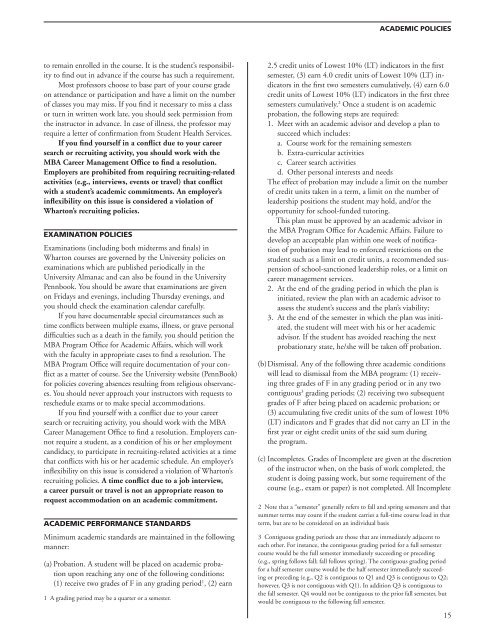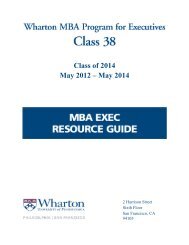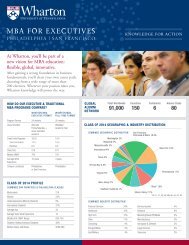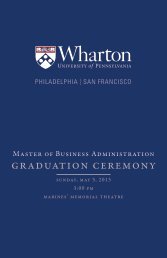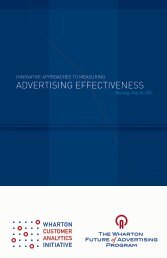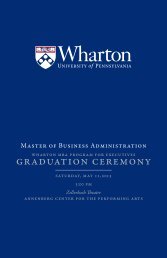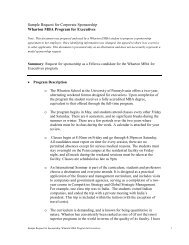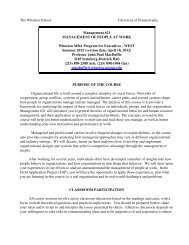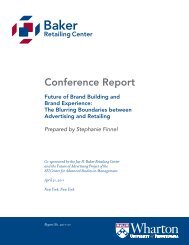Explore Options; Plan Your MBA Academic Program
Explore Options; Plan Your MBA Academic Program
Explore Options; Plan Your MBA Academic Program
You also want an ePaper? Increase the reach of your titles
YUMPU automatically turns print PDFs into web optimized ePapers that Google loves.
to remain enrolled in the course . It is the student’s responsibility<br />
to find out in advance if the course has such a requirement .<br />
Most professors choose to base part of your course grade<br />
on attendance or participation and have a limit on the number<br />
of classes you may miss . If you find it necessary to miss a class<br />
or turn in written work late, you should seek permission from<br />
the instructor in advance . In case of illness, the professor may<br />
require a letter of confirmation from Student Health Services.<br />
If you find yourself in a conflict due to your career<br />
search or recruiting activity, you should work with the<br />
<strong>MBA</strong> Career Management Office to find a resolution.<br />
Employers are prohibited from requiring recruiting-related<br />
activities (e.g., interviews, events or travel) that conflict<br />
with a student’s academic commitments. An employer’s<br />
inflexibility on this issue is considered a violation of<br />
Wharton’s recruiting policies.<br />
EXAMINATION POLICIES<br />
Examinations (including both midterms and finals) in<br />
Wharton courses are governed by the University policies on<br />
examinations which are published periodically in the<br />
University Almanac and can also be found in the University<br />
Pennbook . You should be aware that examinations are given<br />
on Fridays and evenings, including Thursday evenings, and<br />
you should check the examination calendar carefully .<br />
If you have documentable special circumstances such as<br />
time conflicts between multiple exams, illness, or grave personal<br />
difficulties such as a death in the family, you should petition the<br />
<strong>MBA</strong> <strong>Program</strong> Office for <strong>Academic</strong> Affairs, which will work<br />
with the faculty in appropriate cases to find a resolution . The<br />
<strong>MBA</strong> <strong>Program</strong> Office will require documentation of your conflict<br />
as a matter of course . See the University website (PennBook)<br />
for policies covering absences resulting from religious observances<br />
. You should never approach your instructors with requests to<br />
reschedule exams or to make special accommodations .<br />
If you find yourself with a conflict due to your career<br />
search or recruiting activity, you should work with the <strong>MBA</strong><br />
Career Management Office to find a resolution . Employers cannot<br />
require a student, as a condition of his or her employment<br />
candidacy, to participate in recruiting-related activities at a time<br />
that conflicts with his or her academic schedule . An employer’s<br />
inflexibility on this issue is considered a violation of Wharton’s<br />
recruiting policies . A time conflict due to a job interview,<br />
a career pursuit or travel is not an appropriate reason to<br />
request accommodation on an academic commitment.<br />
ACADEMIC PERFORMANCE STANDARDS<br />
Minimum academic standards are maintained in the following<br />
manner:<br />
(a) Probation . A student will be placed on academic probation<br />
upon reaching any one of the following conditions:<br />
(1) receive two grades of F in any grading period 1 , (2) earn<br />
1 A grading period may be a quarter or a semester .<br />
ACADEMIC POLICIES<br />
2 .5 credit units of Lowest 10% (LT) indicators in the first<br />
semester, (3) earn 4 .0 credit units of Lowest 10% (LT) indicators<br />
in the first two semesters cumulatively, (4) earn 6 .0<br />
credit units of Lowest 10% (LT) indicators in the first three<br />
semesters cumulatively . 2 Once a student is on academic<br />
probation, the following steps are required:<br />
1 . Meet with an academic advisor and develop a plan to<br />
succeed which includes:<br />
a . Course work for the remaining semesters<br />
b . Extra-curricular activities<br />
c . Career search activities<br />
d . Other personal interests and needs<br />
The effect of probation may include a limit on the number<br />
of credit units taken in a term, a limit on the number of<br />
leadership positions the student may hold, and/or the<br />
opportunity for school-funded tutoring .<br />
This plan must be approved by an academic advisor in<br />
the <strong>MBA</strong> <strong>Program</strong> Office for <strong>Academic</strong> Affairs . Failure to<br />
develop an acceptable plan within one week of notification<br />
of probation may lead to enforced restrictions on the<br />
student such as a limit on credit units, a recommended suspension<br />
of school-sanctioned leadership roles, or a limit on<br />
career management services .<br />
2 . At the end of the grading period in which the plan is<br />
initiated, review the plan with an academic advisor to<br />
assess the student’s success and the plan’s viability;<br />
3 . At the end of the semester in which the plan was initiated,<br />
the student will meet with his or her academic<br />
advisor . If the student has avoided reaching the next<br />
probationary state, he/she will be taken off probation.<br />
(b)Dismissal. Any of the following three academic conditions<br />
will lead to dismissal from the <strong>MBA</strong> program: (1) receiving<br />
three grades of F in any grading period or in any two<br />
contiguous 3 grading periods; (2) receiving two subsequent<br />
grades of F after being placed on academic probation; or<br />
(3) accumulating five credit units of the sum of lowest 10%<br />
(LT) indicators and F grades that did not carry an LT in the<br />
first year or eight credit units of the said sum during<br />
the program .<br />
(c) Incompletes . Grades of Incomplete are given at the discretion<br />
of the instructor when, on the basis of work completed, the<br />
student is doing passing work, but some requirement of the<br />
course (e .g ., exam or paper) is not completed . All Incomplete<br />
2 Note that a “semester” generally refers to fall and spring semesters and that<br />
summer terms may count if the student carries a full-time course load in that<br />
term, but are to be considered on an individual basis<br />
3 Contiguous grading periods are those that are immediately adjacent to<br />
each other . For instance, the contiguous grading period for a full semester<br />
course would be the full semester immediately succeeding or preceding<br />
(e .g ., spring follows fall; fall follows spring) . The contiguous grading period<br />
for a half semester course would be the half semester immediately succeeding<br />
or preceding (e .g ., Q2 is contiguous to Q1 and Q3 is contiguous to Q2;<br />
however, Q3 is not contiguous with Q1) . In addition Q3 is contiguous to<br />
the fall semester . Q4 would not be contiguous to the prior fall semester, but<br />
would be contiguous to the following fall semester .<br />
15


